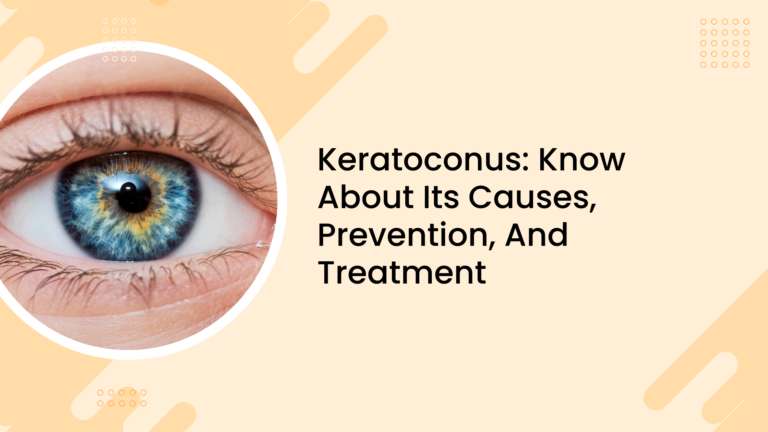
Keratoconus is a creeping eye disease that affects approximately one in two thousand individuals. Its gradual progression and subtle symptoms often lead to it being mistaken for common vision problems.
Keratoconus primarily impacts the cornea, the eye’s outer layer responsible for 80-90% of vision. This makes regular visits to an ophthalmologist crucial, especially if you experience persistent vision issues. Dr.Vinay Agrawal(M.B.B.S., M.S. (ophthalmology), D.N.B. (Ophthalmology), Cornea Fellow, L.V.Prasad Eye Institute) leading Keratoconus specialist in Mumbai can provide routine eye check-ups, which are vital for early diagnosis and prevention of various eye conditions.
Understanding Keratoconus
What is Keratoconus?
Keratoconus is a condition where the cornea, which is usually round, becomes thin and bulges into a cone-like shape. This change occurs because the cornea’s collagen fibers, which provide structural support, weaken and fail to maintain its normal shape.
Causes of Keratoconus:
The exact cause of keratoconus is not fully understood, but several factors can contribute to its development:
Hereditary Factors
A family history of keratoconus increases the likelihood of developing the condition. Regular eye examinations can help detect keratoconus early if there is a known family history.
Age Group
Keratoconus often starts in the teenage years and can progress into the early 30s. However, it can also develop in older individuals.
Underlying Diseases
Certain medical conditions, such as Down syndrome, osteogenesis imperfecta, and retinitis pigmentosa, have been linked to a higher risk of keratoconus.
Excessive Eye Rubbing
Frequent and vigorous eye rubbing can damage the cornea, making it more susceptible to keratoconus.
Inflammation
Chronic inflammation from conditions like asthma, allergies, and atopic eye diseases can weaken the cornea’s structure, contributing to keratoconus.
Symptoms of Keratoconus
Identifying keratoconus can be challenging due to its subtle symptoms. Common signs include:
- Blurry vision
- Frequent changes in eyeglass prescriptions
- Glare and halos around lights
- Multiple images or ghosting
Treatments for Keratoconus
Treating keratoconus focuses on strengthening the corneal tissue and correcting vision problems. Available treatments include:
1)Glasses and Contact Lenses
In the early stages, glasses and specialized contact lenses can help improve vision.
2)Surgical Options
For advanced cases, various surgical procedures are available, including:
Corneal Transplants:Involves replacing the damaged cornea with a healthy donor cornea.
Corneal Crosslinking: A minimally invasive procedure that strengthens the corneal tissue to halt disease progression.
– Intracorneal Rings
Plastic rings are inserted into the cornea to reshape and stabilize it.
– Toric Implantable Contact Lenses
Permanent lenses are implanted in the eye to correct vision in non-progressive keratoconus cases.
Why Choose the Keratoconus Treatment Center in Mumbai?
The Keratoconus Treatment Center in Mumbai is a leading clinic specializing in the treatment of keratoconus. Our center is equipped with state-of-the-art technology and led by Dr.Vinay Agrawal, one of the best keratoconus specialists and surgeons in Mumbai. We offer comprehensive care tailored to each patient’s unique needs, ensuring the highest standards of treatment and patient satisfaction.
Our Commitment to Eye Health
Keratoconus Treatment Center in Santacruz is dedicated to providing valuable information and exceptional care to all our patients. Regular eye check-ups can prevent many eye diseases and preserve vision health. We encourage you to take proactive steps for your eye health and that of your family.